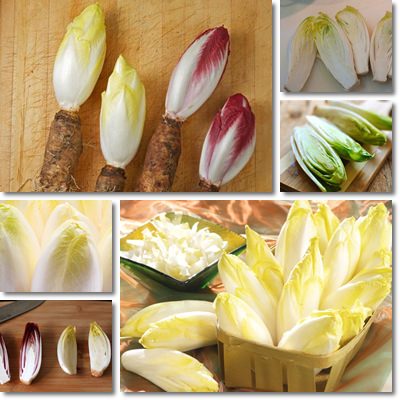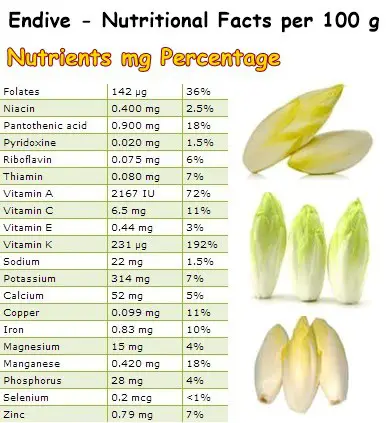The escarole or endive (Cichorium endivia) is a popular leaf vegetable in the chicory family. Despite their bitter taste, endives are quite healthy, especially when eaten raw. The vegetable is packed with vitamin K, a potent natural anti-inflammatory nutrient with great cancer-preventive properties. Eating it on a regular basis helps regulate both blood sugar and blood cholesterol levels and offers excellent protection against atherosclerosis.
Moreover, endive consumption increases calcium absorption in bones and teeth and helps prevent osteoporosis.
Thanks to a high vitamin K content, the vegetable supports blood coagulation processes and provides anti-inflammatory benefits. It is further good for digestive health, encouraging a healthy gut flora as a result of a high dietary fiber content. The high vitamin A content of endives makes them good for eyesight, supporting vision acuity and reducing risks of macular degeneration.
Vitamin A is also a great nutrient for a strong immune system, promoting healthy mucous membranes of the nose, mouth, throat, lungs and digestive tract. Overall, the benefits of eating endives are pretty impressive and varied, with a span over all systems and organs.

What do endives look like?
Endives look very much like an elongated bulb of tightly-wrapped leaves. Starting from the bottom (the part nearest to the stem) and halfway up, the leaves are pretty much white. The top part of the leaves ranges in color from a light yellow to bright green in white endives and red in red endives. Despite looking very much like other chicory vegetables, endives are different from Belgian endives and radicchio from both a botanical and a culinary point of view, but less from a nutritional aspect, the only thing in common except for their parentage being their bitter flavor.
What do endives taste like?
Unfortunately, the endive is quite a bitter vegetable. However, flavor depends immensely on the stage of ripeness. If harvested before they reach full maturity, endives are tender and crisp and only slightly bitter. At this stage, they can be used raw, in salads or as a side dish. If left to mature, the leaves turn woody and bitter and will most likely need cooking to be made for palatable.
How to make endives less bitter
Here are a few methods that help reduce the bitterness in endive leaves:
- Add lemon juice and spices. Raw endives have a mild flavor but if you still find it a bit too much, then you can always squeeze some lemon juice over it and season it with salt, pepper and so on.
- Rinse in cold water. More than once. Apparently, rinsing more mature endive leaves in cold or iced water several times can help tone down the bitterness.
- Blanch that endive. If you already plan on cooking your endives, you can throw the leaves in a pot of boiling water for around 30 seconds, take them out and put them in a bowl of cold or ice water. Blanching should help extract most of the bitterness in the leaves.
- Don’t chew too much. As funny as it may sound, you should just try to enjoy your endives. Don’t focus too much on their taste, just eat them. Taking smaller bites instead of stuffing our mouths full of the vegetable to see it off of our plates already can also help make it more palatable simply because we finish each bite faster and the bitterness doesn’t linger. Over-chewing, just like overthinking, takes all the fun out of the experience.

What are the benefits of endives?
If you’ve ever wondered what are endives good for, know that while they may not rank first as far as taste is concerned, they do boast a rather impressive nutritional profile and hold some excellent health properties. See below the top 8 nutrition facts and health benefits of the broad-leaved endive:
Great cholesterol-lowering properties
Endives provide approximately 3 g of dietary fiber/100 g of raw leaves. Dietary fiber partially prevents the absorption of fats from the foods we eat at intestinal level, indirectly contributing to lowering blood cholesterol levels.
Regulate blood sugar levels
Endives are a good source of inulin, a special type of soluble dietary fiber which was shown to help stabilize blood sugar levels by slowing down digestion and absorption of sugar in the blood. They are thus safe to eat if you are struggling with hyperglycemia or type-2 diabetes.

Arterial calcification and osteoporosis prevention
As you can see in the nutrition table above, the endive is a vegetable rich in vitamin K, a nutrient responsible for the correct absorption and storage of calcium. More exactly, vitamin K redirects calcium to bones and teeth and, by doing this, it prevents it from being stored incorrectly in places such as joints, artery walls or heart valves.
This contributes to strong, healthy bones, preventing bone demineralization which, in time, causes osteoporosis. At the same time, it protects against arterial calcification, a condition greatly favored by a vitamin K deficiency and a high calcium intake. Including vitamin K-rich foods such as endives, chard or curly endive in our diet is crucial for maintaining bone and cardiovascular health. However, if you are on anticoagulants, it is recommended to limit intake of leaf vegetables and other vitamin K rich foods.
Also see the benefits of curly endive.
Promote digestive health
Inulin, a type of soluble dietary fiber found in endives, is a natural probiotic, favoring the development of healthy gut flora (microbiota). The good bacteria in our digestive system not only support the digestion process by helping digest certain fibers, sugars, starches, lactose and so on, but also protect the gut mucosa from injury and promote good immunity.
Benefits for constipation and colon health
Eating endive helps relieve constipation and protects the health of the colon mucosa. With around 3 g of dietary fiber/100 g of leaves, the endive contributes to improving intestinal transit and relieving constipation. Also, by minimizing the time the colon is exposed to the toxins in waste material, the endive is said to promote colon health.
Natural immune booster
Due to its mild probiotic properties, the endive favors the development of healthy gut bacteria and stimulates immunity by means of a favorable interaction with the lymphoid (immunity) tissues at the level of the digestive tract.
Moreover, it is a rich source of vitamin A (72%), a nutrient known to protect the integrity of the mucous membranes at the level of the eyes, nose, mouth, throat, lungs and digestive tract, the parts of our body directly exposed to pathogens from the outside world. By ensuring their health, vitamin A prevents possible breaches and subsequent infections.
Promote good eyesight
Rich in vitamin A, the endive is a great choice for maintaining good eyesight. Including vitamin A-rich foods such as green leafy vegetables, sweet potatoes and carrots is the key to great vision. A more comprehensive list of vegetables with their benefits and side effects can be found in the foods map section in the menu above.
Anti-inflammatory and cancer-protective properties
Rich in potent natural anti-inflammatory and antioxidant agents, the endive should provide great cancer-protective properties. A new treatment for prostate cancer is currently under research and it consists of high doses of vitamins C and K (5.000 mg and 50 mg) being administered by a physician for prolonged periods of time.
Both vitamins are already known to posses excellent antioxidant and anti-inflammatory properties, preventing carcinogens (cancer-causing substances) from binding to our DNA and cells from mutating as a result of free radical damage buildup. While we keep our fingers crossed for the researchers, prevention remains crucial so reconsidering our diets so as to include healthy foods should constitute the best protection against most forms of chronic disease.
Conclusion
Overall, the endive is a genuinely nutritious vegetable with wonderful health benefits. It offers support to our body during vitamin-demanding periods of time such as pregnancy (excellent source of folic acid). Just like the curly endive, it has only 17 kcal/100 g of leaves, making it ideal for maintaining a steady weight. With practically no fat and more than 93% water, it is recommended for consumption if you are struggling to keep cholesterol levels under control.
